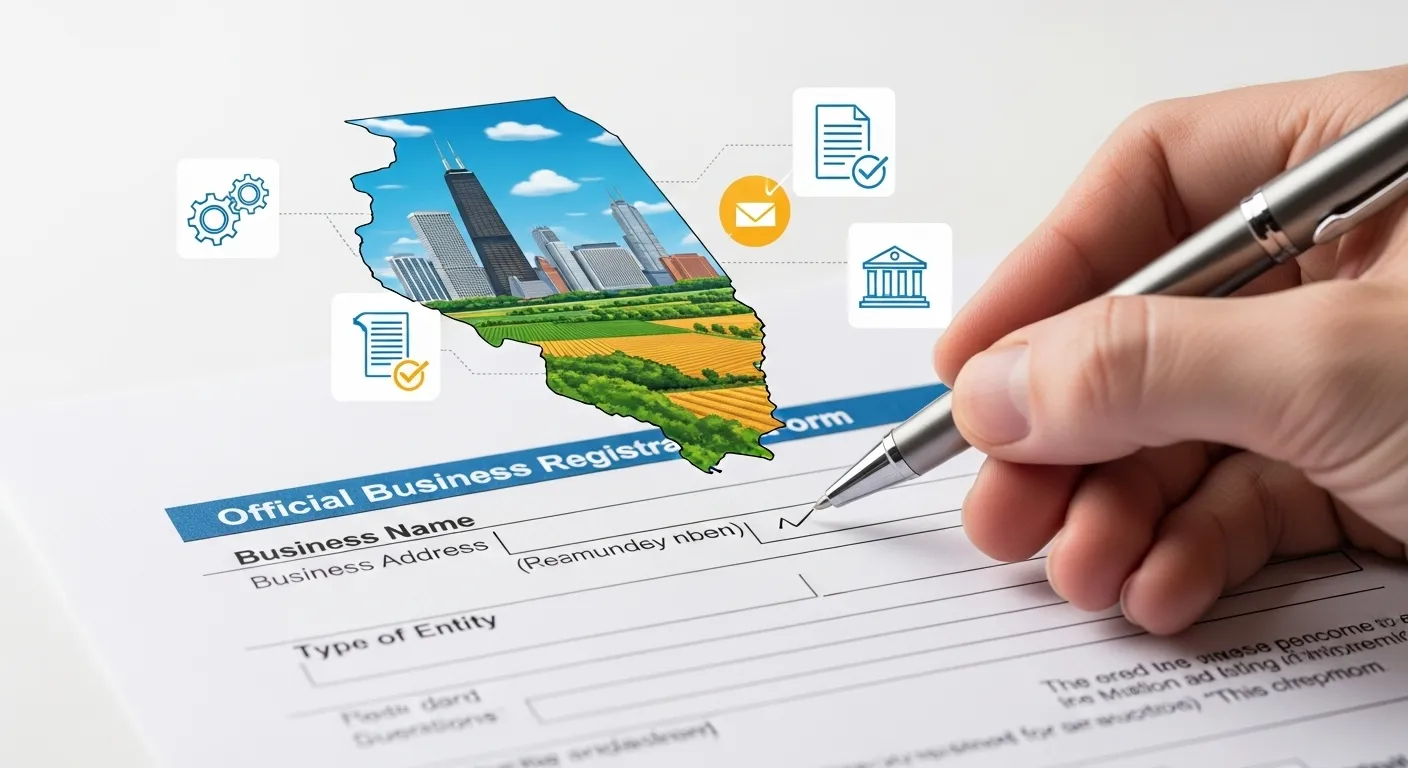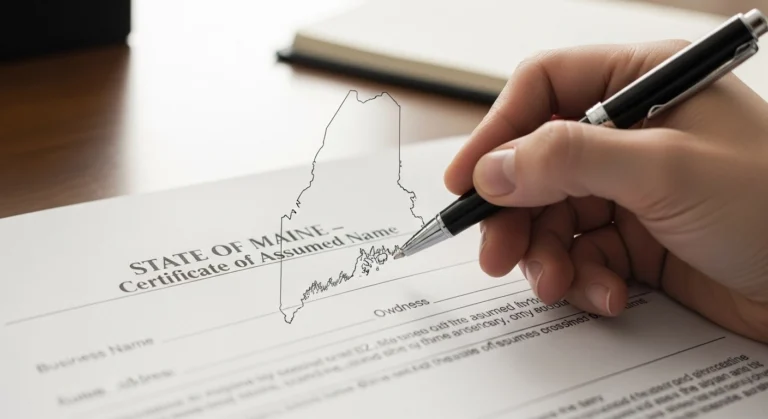Thinking about starting a business in Illinois? Great choice! The state’s strong economy and central location make it a solid place to grow. Before you start, remember that registration depends on your business structure: LLC, corporation, partnership, or sole proprietorship. Each has its own filing steps and requirements.
This guide walks you through the process step by step, from choosing a name to getting an EIN and the right licenses, so you can register your business in Illinois with confidence.
Step 1: Choose Your Business Structure
Your first step in registering a business is selecting the right business structure. The foundation of how your company will operate legally and financially. Common options include LLC (Limited Liability Company), Corporation, Partnership, and Sole Proprietorship.
When deciding, consider key factors like liability protection, tax implications, ownership flexibility, and management structure.
Pro Tip: Most small business owners choose an LLC because it offers personal liability protection, flexible management, and simpler tax filing compared to a corporation.
Step 2: Pick a Business Name
Your business name is your brand’s first impression, so choose one that’s unique and follows Illinois naming guidelines. The name must be distinguishable from any existing business registered in the state and cannot include restricted terms like “bank” or “insurance” unless properly licensed.
To verify name availability, use the Illinois Secretary of State’s online database, which allows you to search existing names quickly. If you find a name you like but aren’t ready to file your LLC yet, you can reserve it for 90 days by submitting Form LLC-1.15 or completing the reservation process through the Secretary of State’s online system.
Step 3: Appoint a Registered Agent
Every business registered in Illinois must designate a registered agent, a person or service responsible for receiving legal documents, state correspondence, and compliance notices on your behalf.
Your registered agent must have a physical address in Illinois (P.O. boxes are not allowed) and be available during normal business hours. You can appoint yourself, another individual, or a professional registered agent service to handle this role.
Why it matters: Having a reliable registered agent ensures you never miss important legal or tax notices that could affect your business’s good standing.
Step 4: File Your Formation Documents
Once you’ve chosen your business name and structure, the next step is to officially register your business with the Illinois Secretary of State.
- For an LLC: File the Articles of Organization (Form LLC-5.5).
- For a Corporation: File the Articles of Incorporation (Form BCA-2.10).
You can submit these forms online or by mail through the Illinois Secretary of State’s website. Be sure to include the required filing fees, typically $150 for LLCs and $150 or more for corporations, depending on your share structure. Once approved, you’ll receive confirmation that your business is legally recognized in Illinois.
Step 5: Get an EIN (Employer Identification Number)
An EIN, or Employer Identification Number, is your business’s federal tax ID, similar to a Social Security number but for your company. You’ll need it to file taxes, open a business bank account, and hire employees.
The good news? It’s completely free and can be obtained in minutes through the IRS website (IRS.gov).
While most business structures (LLCs, corporations, and partnerships) are required to have one, some sole proprietors without employees may not need an EIN. Though it’s still recommended for separating personal and business finances.
Step 6: Register for Illinois State Taxes
Depending on your business activities, you may need to register for various state taxes such as sales tax, income tax withholding, or unemployment insurance tax. You can complete this process online through MyTax Illinois, the official portal of the Illinois Department of Revenue. This platform lets you file, pay, and manage state business taxes conveniently.
Check whether your city or county has local tax requirements — for example, certain municipalities in Illinois may impose additional business or sales taxes that you’ll need to register for separately.
Step 7: Obtain Business Licenses and Permits
Before operating, make sure your business complies with state and local licensing laws. Requirements vary by city or county, so always check with your local government offices.
Common examples include:
- Health permits for food-related businesses
- Professional licenses for certain trades (like contractors or cosmetologists)
- Zoning approvals for physical business locations
You can visit the Illinois Business Portal to look up and apply for the specific licenses and permits your business may need.
Step 8: Open a Business Bank Account
Opening a dedicated business bank account is a key step in keeping your finances organized and compliant. Separating your personal and business funds protects your limited liability, simplifies accounting, and helps you track income and expenses clearly.
To open an account, most banks will ask for your EIN (Employer Identification Number), Articles of Organization or Incorporation, and an Operating Agreement (for LLCs). A business account also helps you build credit, establish a professional financial history, and makes it easier to qualify for loans or payment processing services as your company grows.
Step 9: Create an Operating Agreement or Bylaws
An Operating Agreement (for LLCs) or Bylaws (for corporations) outlines how your business will be managed, who owns what, and how decisions are made.
- LLCs: The Operating Agreement isn’t filed with the state, but it’s strongly recommended. It defines member roles, profit distribution, and procedures for adding or removing members.
- Corporations: Bylaws are required and serve as the company’s internal rulebook, detailing board responsibilities, voting rights, and meeting procedures.
Having these documents in place helps prevent disputes and ensures your business runs smoothly and legally.
Step 10: Stay Compliant
Once your business is up and running, maintaining compliance is crucial to avoid penalties or dissolution. In Illinois, all LLCs and corporations must file annual reports with the Secretary of State and pay the required renewal fees to stay in good standing.
You’ll also need to keep your state and federal tax filings up to date, including income, sales, and employment taxes. Don’t forget to renew any business licenses or permits on time and ensure your registered agent information remains current. Staying compliant keeps your business legally protected and ensures smooth operations year after year.
Final Tips
Before you finalize your Illinois business registration, double-check for any local city or county requirements, as places like Chicago, Springfield, and Peoria may have additional licensing or zoning regulations.
If you live outside Illinois, it’s smart to hire an Illinois-registered agent service to handle legal documents and ensure you never miss important notices. Finally, always keep both digital and printed copies of your formation documents, tax IDs, and licenses for easy access and record-keeping. Staying organized from the start sets your business up for long-term success.
Conclusion
Starting a business in Illinois may seem complex, but taking it one step at a time makes the process smooth and manageable. Once your registration is complete, the next important move is to open a business bank account to keep your finances organized and professional (see our guide on the best business bank accounts for LLCs).
Frequently Asked Questions
Starting a business in Illinois is exciting, but it’s natural to wonder about the costs, timelines, and steps involved. Here are quick answers to common questions new business owners have.
What Does It Cost to Start a Business in Illinois?
Costs vary by structure. Registering an LLC or corporation with the Secretary of State costs around $150. Sole proprietors filing a DBA pay about $50. Don’t forget possible extras like a registered agent ($50–$150/year) and annual report fees ($75 for LLCs, $50 for corporations).
How Long Does the Registration Process Take?
Online filings are usually approved in 3–5 business days, while mail submissions may take 2–3 weeks. Need it faster? Illinois offers expedited processing for an added fee, often within 24 hours.
Can I Register My Business Online?
Yes! You can file your LLC, corporation, or DBA directly through the Illinois Secretary of State’s website. It’s the quickest and most efficient way to complete the process.
Do I Need Professional Help to Register My Business?
Not necessarily. Many small business owners handle registration themselves using online tools. Still, if your business has partners, complex contracts, or operates in a regulated field, consulting a lawyer or formation service can save you time and headaches.




